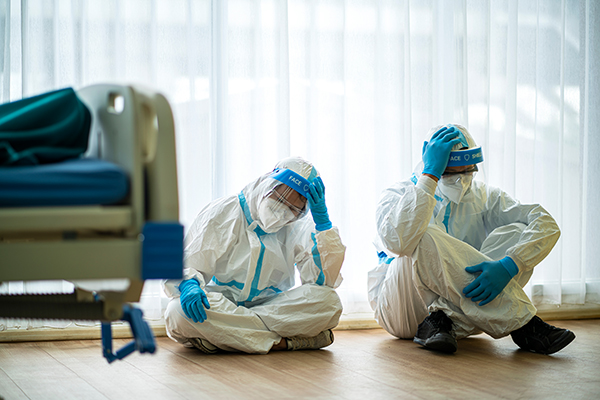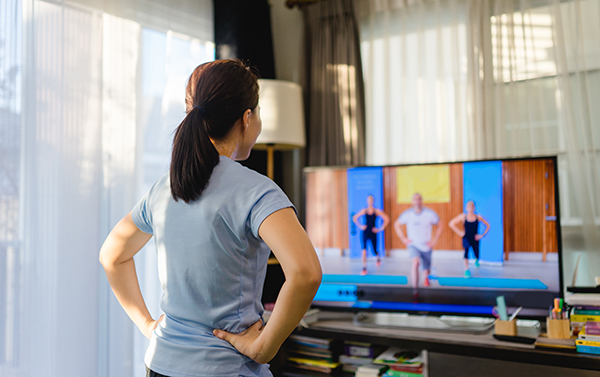COVID-19 cases are dropping in the country, thanks to the massive COVID-19 vaccination efforts. Plus, advances in technology are making regular patient consultations possible virtually. Despite the developments, many local healthcare professionals still find working under pandemic conditions overwhelming. There is still a cloud of threat to the mental health of healthcare workers in this pandemic. Teleconsultations that last until late evening and being away from loved ones for extended periods are just some of the issues that continue to affect them.

Threats to the Mental Health of Healthcare Workers
The webinar “Kumusta Dok — The Afterlife: Emerging After COVID“, has provided healthcare professionals a way to identify and manage symptoms of burnout. They are also given tips to achieve that balance of taking care of their patients and their well-being.
“Going through stressful life experiences can be unhealthy because this could lead to mental health conditions such as anxiety and depression,” webinar speaker Dr. Robert Buenaventura said. He adds, “we have commonly seen since the pandemic started.”
“If you show symptoms of burnout, it’s a good idea to see a mental health professional. You have to realize that help is available.”

Dr. Buenaventura is the head of the Department of Neurosciences at Manila TheologicalCollege and associate professor in human life span and psychiatry at La Consolacion University Philippines.
About Kumusta Dok
Kumusta Dok is an initiative that aims to empower patients to reconnect with their doctors during the new normal. As the name suggests, patients can intentionally ask their physicians about how they are.
Moreover, the Kumusta Dok initiative also gives tips and updates on the channels available for patients to strengthen partnerships with doctors throughout the health-seeking journey. It shares efforts being made by healthcare facilities to ensure the safety of patients and healthcare staff while delivering appropriate care. It likewise partners with medical societies to create educational and wellness platforms for healthcare professionals as we live through this pandemic.
The Pandemic Mentally Hurt Healthcare Workers
Based on a study1 conducted during the height of the pandemic, out of 516 healthcare workers in the Philippines, 70.7% have anxiety symptoms. The study revealed that the pandemic had a huge psychological impact on the majority of healthcare workers.
According to Dr. Buenaventura, red flags to watch out for indicating too much stress or a mental health condition include a change in moods, memory, and behavior. The healthcare worker may also experience lower productivity and incur frequent absenteeism. Those who suffer mental burnout also have a tendency to withdraw from social connections and ignore personal self-care and hygiene.
Diagnosis and Help
To manage these symptoms and get a proper diagnosis or treatment plan, Dr. Buenaventura suggests seeking the help of a mental health professional who can be reached via teleconsultation or in-person visits. Another way to contact a mental health professional or a trained counselor is via anonymous, 24/7 hotlines.

“Consultations don’t necessarily have to be about a mental disorder,” Dr. Buenaventura added. “It can just be about the stress that can be managed by other means. But you need to identify and accept that the problem exists because that is the first step to doing something about it.”
Therapeutic Maneuvers
Those who are not receptive to meeting a mental health professional can instead engage in doing stress management techniques to cope with burnout symptoms. Their options include exercise, adopting a healthy diet, or getting enough sleep.

They can also try other therapeutic maneuvers such as meditation or mindfulness, correcting negative thoughts, or progressive muscle relaxation.
“Self-care is very crucial because it’s an integral part of professional fulfillment,” Dr. Buenaventura said.
Note: If you’re a healthcare worker and showing symptoms of anxiety and burnout, take the necessary steps to get help. Consider taking a break or talking to a trusted friend or a professional.


Buti po my mga ganito 🙂 napakalaking tulong po nito sah mga frontliners nten ☺️☺️ salute 🫡
Even if they are doctors/health workers they also need help. Sila talaga ang mas affected at mas mahirap ang pinagdadaanan dahil sa pandemya. Kaya kailangan talagang my mga professionals na makakatulong sakanila para malabanan ang stress, anxiety and depression. In these days, mental health is our top priority.
Nakakatuwa to, kasi kahit mga doctor at nurse kailangan ang ganyan dahil mas mahirap ang trabaho nila at delikado para sa panahon ngayon. Kailangan din ng mga taong makakatulong para sakila, para mangalaga sa kalusugan din nila. Salute to all frontliners!